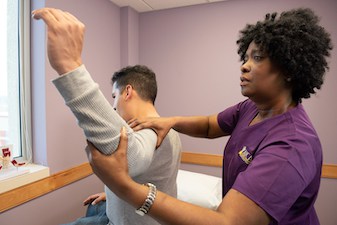What Are Some of the Most Common Shoulder Injuries?
Oftentimes, shoulder issues can be traced back to a specific issue with the rotator cuff. The shoulder is a very flexible joint, but it is not known for its stability, causing it to be prone to issues with the muscles that allow it to function properly. These 4 muscles make up the rotator cuff. The rotator cuff can become torn from an acute injury or relative to the age or occupation of the individual with the injury. A torn rotator cuff is typically able to be treated without the need for shoulder surgery. Other rotator cuff-related injuries include strains, tendonitis, and bursitis. Strains occur over time as a result of overuse. They aren’t overwhelmingly serious injuries, but they can cause noticeable pain. Tendonitis is an injury that occurs when the muscles of the rotator cuff are used more than normal, as usually happens when someone has to reach over their head for extended periods of time or with great force. Athletes are often the victims of tendonitis pain. Bursitis occurs when the bursa or fluid sacs between the musculature and the bones of the shoulder are inflamed.
The shoulder can sustain other injuries than just the rotator cuff issues previously discussed. Obviously, most people are familiar with shoulder dislocations, which are painful injuries where the upper arm bone comes out of its place in the shoulder blade. They aren’t necessarily serious injuries, but they should be properly reduced by a medical professional. The shoulder is also vulnerable to osteoarthritis-related pain, particularly in the lives of older patients. Individuals who suffer from arthritic shoulders will tend to experience chronic pain and seek to have it managed by a medical professional.
What Types of Doctors Should You Reach Out to for Shoulder Injury Treatment?
 The most common types of specialists you might either seek out or be referred to by your primary care physician in reference to your shoulder pain are orthopedic doctors and physical therapists. These physicians are trained experts in the functions of the muscular and skeletal systems, and they will help you to formulate a comprehensive treatment plan to address your pain. Orthopedic doctors and surgeons will perform any procedures which might be needed to heal your shoulder injury. They will be responsible for any surgical interventions you require and will supervise or order the various injection therapies, medication regimens, and physical therapy plans you may continue to promote optimal healing. The physical therapist you see will manage either your post-operative or treatment-oriented physiotherapy. In many milder cases of shoulder injury, physiotherapy is the primary focus of the rehabilitation plan.
The most common types of specialists you might either seek out or be referred to by your primary care physician in reference to your shoulder pain are orthopedic doctors and physical therapists. These physicians are trained experts in the functions of the muscular and skeletal systems, and they will help you to formulate a comprehensive treatment plan to address your pain. Orthopedic doctors and surgeons will perform any procedures which might be needed to heal your shoulder injury. They will be responsible for any surgical interventions you require and will supervise or order the various injection therapies, medication regimens, and physical therapy plans you may continue to promote optimal healing. The physical therapist you see will manage either your post-operative or treatment-oriented physiotherapy. In many milder cases of shoulder injury, physiotherapy is the primary focus of the rehabilitation plan.
What Treatments Exist to Address Shoulder Pain and Injury?
To treat the most severe shoulder injuries such as rotator cuff tears with complications, dislocations, and degenerative disease-related pain, such as arthritis, orthopedic surgery may be necessary. Some tears and dislocations aren’t as “by the book” as one might hope. In more complicated scenarios, surgery will be performed to fully correct the acute injury that has occurred. Medical and technological advancements in recent years have allowed for many of these surgeries to be performed arthroscopically, or through a small incision, as opposed to a large incision. In the later stages of osteoarthritis, doctors may determine that a joint replacement surgery will deliver optimal results for the patient. This procedure is performed by an orthopedic surgeon. More commonly, your orthopedic physician will work with a physical therapist to treat your pain or injury in-office using less invasive techniques. Injections of steroids can produce tremendous results for those with severe inflammation. Therapeutic exercises and physiotherapy can help to relieve chronic shoulder pain. Finally, medications are a huge promoter of success for the pain management plan of those with shoulder injuries.



 The most common types of specialists you might either seek out or be referred to by your primary care physician in reference to your shoulder pain are
The most common types of specialists you might either seek out or be referred to by your primary care physician in reference to your shoulder pain are 












